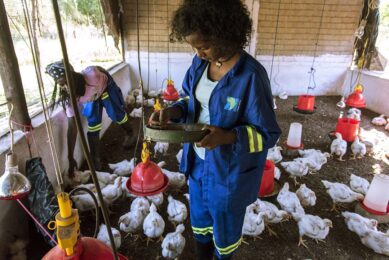UGA wins grant to produce healthier chickens in Africa and Asia
Georgia’s reputation as a producer of poultry recently got a boost from the Bill & Melinda Gates Foundation, which has awarded a $1.6 million grant to the University of Georgia Research Foundation to develop a new disease-resistant breed of chickens.
The grant is to support the efforts of a team of UGA and U.S. Agriculture Department researchers to develop chickens resistant to Newcastle Virus. According to Steven Stice, a Georgia Research Alliance eminent scholar who is overseeing the project, the Newcastle Virus kills about one-quarter of the chickens raised in sub-Saharan Africa every year. “The virus can eventually kill an entire flock if it gets to just one.”
Dr. Stice is an animal and dairy professor in the College of Agricultural and Environmental Sciences and is director of the university’s Regenerative Bioscience Center. His interests include discovering new treatments for degenerative diseases such as Parkinson’s, Alzheimer’s and Multiple Sclerosis. He also has been active in researching animal stem cells and leads a team that has produced more than 50 cloned calves and 100 cloned pigs.
He said that it took months to complete the application addressing the problems the Newcastle Virus presents to smallholder farmers in sub-Saharan Africa and Southeast Asia where poultry is an important source of income and protein for the farmers and their families.
The foundation was intrigued by the scope of Dr. Stice’s work, which has included working with the U.S. Navy to use neural cells as biosensors for environmental toxins, and the extent of the problem presented by the virus which can attack 17 billion chickens raised in the southern regions of Africa and Asia. In their research, Dr. Stice’s team will apply a process called cellular adaptive resistance that uses stem cells to create disease resistance in animals.
Join 31,000+ subscribers
Subscribe to our newsletter to stay updated about all the need-to-know content in the poultry sector, three times a week. Beheer
Beheer








 WP Admin
WP Admin  Bewerk bericht
Bewerk bericht